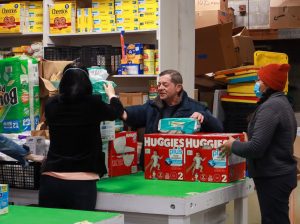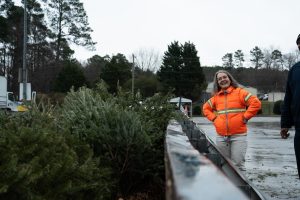If you’ve walked down almost any well-traveled street in Durham during the last four months, you’ve likely seen wadded up masks or disposable gloves along with typical roadside litter like candy wrappers and soda bottles.
The coronavirus pandemic has brought environmental benefits such as reductions in air pollution, carbon emissions and environmental degradation. But littering, with pandemic-linked waste in the mix, has increased.
Across the country, cities have reported higher rates of discarded personal protective equipment like gloves and masks, or PPE, along roads, in parking lots, by bus stops and in waterways.
“We’re really trying to discourage people from doing that because it’s not fair to whoever needs to come along and pick it up afterwards,” said Tania Dautlick, executive director of Keep Durham Beautiful.
In addition to PPE litter, Durham has seen an uptick in all types of trash tossed where it should not go. The city collected 30 tons of litter a month since the pandemic started — four tons more than average, said Phillip Powell Sr., assistant director for Durham’s Department of Public Works Operations and Street Maintenance Division.
People concerned about litter have observed an increase in illegal dumping of household goods and other trash too, according to Dautlick, whose nonprofit group has organized volunteer cleanups of public and private land across the City of Durham and Durham County for decades.
In March, the city’s Waste Disposal and Recycling Center closed to the public, restricting trash and recycling services to curbside pick-up. Residents have been disposing of more items, sometimes leaving trash along roadsides or in the woods.
“People have likely had some extra time to clean up their homes and clean out, and they’ve been looking for a way to get rid of things,” Powell said.
Keeping up with this has proven difficult. In the earlier months of the pandemic, Powell said. That is because operations were scaled back. Employees only cleaned up bus stops, city streets, curbsides and sidewalks along the over 3,000 streets that Public Works maintains when essential.
Keep Durham Beautiful volunteers took a break, too. The nonprofit, which helped mobilize 3,290 cleanup volunteers last year, only recently started handing out its pickup kits again, which contain protective gloves, neon vests and trash bags.
“We had stopped for a little while because we just wanted to support everybody staying home,” said Dautlick. “We also weren’t sure what sort of exposure people could have from litter because we were still learning more about how long the virus lasts on surfaces.”
Keep Durham Beautiful is encouraging residents via social media, bi-weekly newsletters, and their website to get out and collect litter on their own.
For the environmentally conscious, cleaning up litter on roads or trails is a habit. But uncertainties about the new coronavirus pandemic brought a degree of fear to that practice.
Today guidance from public health organizations, including the Center for Disease Control and Prevention, says SARS-CoV-2 spreads most easily from person to person rather than from contaminated surfaces. But the true risks that objects and surfaces pose were not clear at the start of the pandemic.
Luckily research suggests that the virus does not last long in direct sunlight, a fact that quelled some of Keep Durham Beautiful’s members’ fears around picking up roadside litter, Dautlick said.
Still, Dautlick encourages volunteers picking up other people’s trash to “handle it as little as possible, to wear gloves and put it straight into a trash bag, and then don’t sort through it.”
Her organization also urges social distancing and volunteer outings close to home. “We are having a lot of family groups or small friend groups or neighbors going out, up and down their street, but staying socially distant,” she said.
Powell and Dautlick are hopeful that the amount of litter, PPE and illegal dumping will decrease again as more Durham businesses open back up. As people return to work, they will spend less time at home cleaning. And as recycling and trash services get back to normal, litter hauls should return to pre-COVID-19 numbers, they said.
“My hope, certainly, is that people continue to become more aware of the negative impacts of littering and begin to reduce,” Dautlick said.
9th Street reporter Cameron Oglesby can be reached at cameron.oglesby@duke.edu
At top: A discarded mask on the ground not far from Duke Health’s coronavirus drive-up testing site off Erwin Road. Photo by Henry Haggart
Cameron Oglesby






